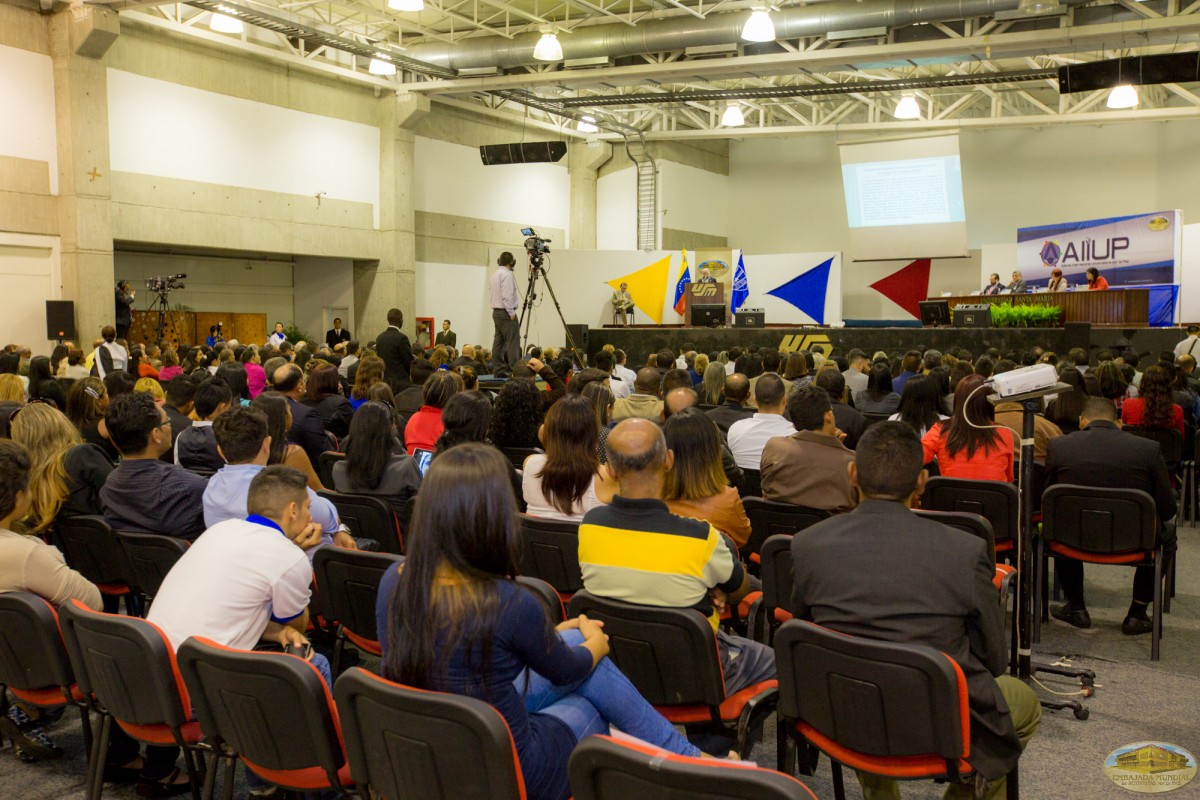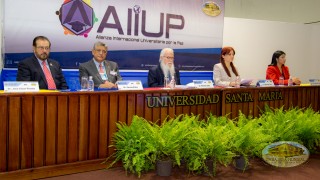The proposals will be discussed at the Peace Integration Summit
With the objective of constructing a culture for peace through education, the International Alliance of Universities for Peace (ALIUP) continues creating academic encounters in different nations for the collaborative elaboration of plans, programs and project proposals that can enrich the Higher Education field. The IV International Seminar – Challenges of Higher Education in Human and Social Development was held in Venezuela on this occasion.
The Grand Hall of the Santa Maria University of the capital city, brought together directors of institutions of Higher Education, university professors, state authorities, international leaders, youth leaders, Activists for Peace and other citizens, to speak on the topic: “Values in the development of Professional Skills.”
Ambassador of Paraguay in Venezuela, Dr. Enrique Ojara Campos; Honorable Senator of Paraguay, Dr. Blanca Fonseca; Dr. Luis Antonio Ortiz, Judge of the Supreme Court of Justice of the Bolivariana Republic of Venezuela; Ambassador Dr. Julio Cesar Pineda; Dr. Luci Bento, Post Graduate Director of the Nihon Gakko University (Paraguay) and Secretary of the ALIUP, among other personalities that have joined this international project, were present during this academic encounter convened by Dr. William Soto, Global Ambassador of the GEAP, and President of the ALIUP.
The proposals of these international seminars that have been held in different Latin American countries, will be discussed during the Peace Integration Summit (CUMIPAZ), which will be carried out in Santiago, Chile on November 6, of this year; and will be considered by the sectors involved in Higher Education.
Academic encounter for a Higher Education that impulses a culture of peace

As part of the Seminar introduction, General Director of the GEAP, Gabriela Lara, shared some of the projects and programs that this organization promotes, which are oriented towards educating and forming public awareness of the integral human being and of the peoples of the world; among these: “Education of the XXI Century of the Peace of the Integral Human Being and of the Nations” (ES21P), project that establishes an integral and holistic educational system, for the complete development of the human being; the educational program “Educating to Remember”, which stimulates an education based on the teachings and promotion of human rights in schools and universities.
“Throughout these projects we have been able to see that humans have the need to achieve peace; and we know that universities play a fundamental role in these teachings and in that transfer of values that allow a human, beyond professional preparation, to become an integral person”, she stated.
To this effect, she invited institutions, academic authorities, professors and other citizens to become part of the alliance of universities, ALIUP, which not only operates in Latin America, but also has important projects in the United States and Spain.
The Vice Rector of the Santa Maria University, Dr. Carlos Enrique Peña, was grateful for the opportunity to host the Seminar and he also said:
“I believe that the promotion of a culture of peace is a mandate of all peoples, and must be conceived as such, but in an integral way, from the formation of a child until it reaches the university level, in a continuous and permanent manner, to achieve the reaffirmation and reinforcement of the purposes that the people of the world desire: peace, not war.”
He also formally proposed the integration of this maximum house of study with the Global Embassy of Activists for Peace (GEAP).
In relation with the constitution of this International Alliance, Dr. Luci Bento, Secretary of the ALIUP and Post Graduate Director of the Nihon Gakko University (Paraguay) – institution that forms part of the founding members of the ALIUP – explained that the judicial forums organized by the GEAP, just as other programs and projects initiated by Dr. Soto, are a source of inspiration for this International Alliance. She also mentioned that Venezuela actively participated from the beginning of ALIUP.
“In such a short time, it has had an international impact at a Latin American level, just as in the Second Latin American Academic Summit, of the Caribbean and the European Union, developed at the Bi-regional Encounter opportunity with Leaders in Brussels, show that these concrete actions of the ALIUP coherently work with one of the objectives of Higher Education: the internationalization of education,” she said.
Proposal of an integral model of education for the trine human being

Dr. William Soto discussed the vital role of education in forming the personality of an individual, which he indicated is crucial in consolidating respect for human rights, and consequently the construction of peace; regarding what is established by the United Nations Organization (UN) and the Universal Declaration of Human Rights (Art. 26 number 2), international instruments that criminalize this approach.
At the same time, he presented an integral and holistic educational model for the formation of the human being considering his trine constitution, soul, spirit and body:
“It is necessary to include in universities a chair for peace, which recognizes the complete nature of the human being, because we have forgotten that the person is not only a physical body, but is also made up of a spirit and heart (or, as many call it, the soul). It is important to understand that the human being is integral and that each of these components needs to receive information, knowledge, a message or word, which will form it, and will strengthen it through a different process.”
He said, referring to the spirit: “The spirit is located in the mind of the human being, it’s the conscious part, the part of the human being that can be educated, where we develop our intelligence; through the spirit we acquire knowledge, abilities and skills, and it is precisely in the spirit where universities work.”
In relation to the heart, he stated that: “It is the heart that can freely decide, what to reject or accept, and what to demonstrate through actions; that is why many speak today on how to educate the heart. The heart gives orders to the mind. This information has been completely substantiated thanks to extensive investigations in this field.” (Read complete speech)
Based on what he expressed, Dr. Soto emphasized on the need of and integral Education, that will not only hone skilled professionals, but human beings that can contribute to a formation of a culture of peace through their profession; understanding that the formation of values appears as a clear requirement of the society of Higher Education.
Knowing Human Rights for the construction of peace
The Senator of Paraguay, Dr. Blanca Fonseca, who has continuously participated in the seminars of ALIUP, spoke on the importance of an Education in Human Rights; at the same time, she presented the projects she runs, related to this topic. Among those she mentioned a project whose purpose is to include in every educational curriculum, the teaching of Human Rights as a subject of study.
“Human Rights are the essential piece for a democratic coexistence (…) That every day we can work together to construct a culture of peace through quality education that is oriented towards the development of professional skills, based on the respect for dignity and the protection and promotion of human rights.” She stated.
Only those who know their rights can demand them
Continuing with the proposals, Dr. Eduardo Torres, representative of the Center for Peace and Human Rights, from the Central University of Venezuela, expressed his commitment to develop the projects of the ALIUP, and during his lecture he spoke on “The promotion of judicial instruments in a culture of peace and Human Rights, for the respect of human dignity”, he referred to the Universal Declaration of Human Rights and the constitutions of each country, saying:
“Educating for dignity by relying on international and national instruments for human rights and a culture of peace (…) The concepts are found in judicial instruments; values that have been gathered by man and have been recognized; and on the other hand, there are rules which form the basis for enforcement. In other words, so we can have educated citizens, citizens who know their rights, who can demand them and everyone can respect them.”
From a subject to a victim: Reconstruction of the psychosocial tissue

“I did not come here to contradict. I came here to take with me a better way to educate,” were the words of Dr. Diana Esther Salgado Ruiz, professor of the Psychology Program of the Cooperative University of Colombia, who, through her experience of working with victims of the armed conflicts of the nation, spoke on the subject, “From a subject to a victim: The reconstruction of the psychosocial tissue” and presented the actions of the greatest house of studies on the subject of peace.
She also spoke of her written article, “The compensation of pain and the subjectivity of trauma,” a written reflection that emerges from working with victims, as a way of saying that nothing can compensate pain.
Also, as leader of the project, “Curriculum Reformation Process” of the Psychology program of the University, she commented on the sessions that have been held, regional seminars, modules on individual-collective memory, tissue reconstruction and peace processes, which were inspired by the GEAP project “Traces to Remember” and articles authored by Dr. Soto on how to treat others well and alarm signals.
Transformational leadership for peace
The focus of Higher Education in Values, based on leadership, was another topic discussed during the seminar, by Iris Gil, representative of the University Institute of Technology Antonio Jose de Sucre from Anzoategui, Venezuela. She stated that:
“Given the situation to improve higher education, emerges the need, and therefore, the educational praxis, to humanize their work to incorporate features that support transformational leadership for peace, which is considered one of the key factors that can positively influence academic dynamics, to achieve a full development in the formation of aptitudes and values in students.”
Youths committed with the International Alliance of Universities for Peace
Important representatives of different higher education houses of Venezuela, also gave their contribution in relation to the role of higher education for the formation of a culture of peace. Luis Miguel Villafañe, representative of the Student Center of the Alejandro Humboldt University said:
“Universities and institutes of Higher Education should prepare future professionals that are capable of using their knowledge, not only in the scientific, technological or economic context, but also to apply it to the solution of greater social needs. Here we have the need to establish new social paradigms based on peace and coexistence, human fraternity, liberty and freedom, respect and the recovery of our planet.”
“Higher Education should be an important tool, it should be great food for the spirit (…) Through Higher Education we should transform leaders, those leaders should start working on the construction of a real culture for peace,” stated Victor Hugo Hidalgo, representative of the Student Center of the Central University of Venezuela.
ALIUP supports the UN resolution
“Education is a power; and we are aware that it is the most powerful weapon we have to transform mentalities; so, it is a fundamental mechanism to modify societies and, consequently, change the world.”
Based on this reflection of Dr. William Soto, the ALIUP works to promote in higher education the development of professional skills through integral formation, and encourage strategic interagency alliances to sow, build and strengthen a culture of peace in society.
In this way, the GEAP supports the UN Resolution 53/243 on the Declaration and Programme of Action on a Culture of Peace.

